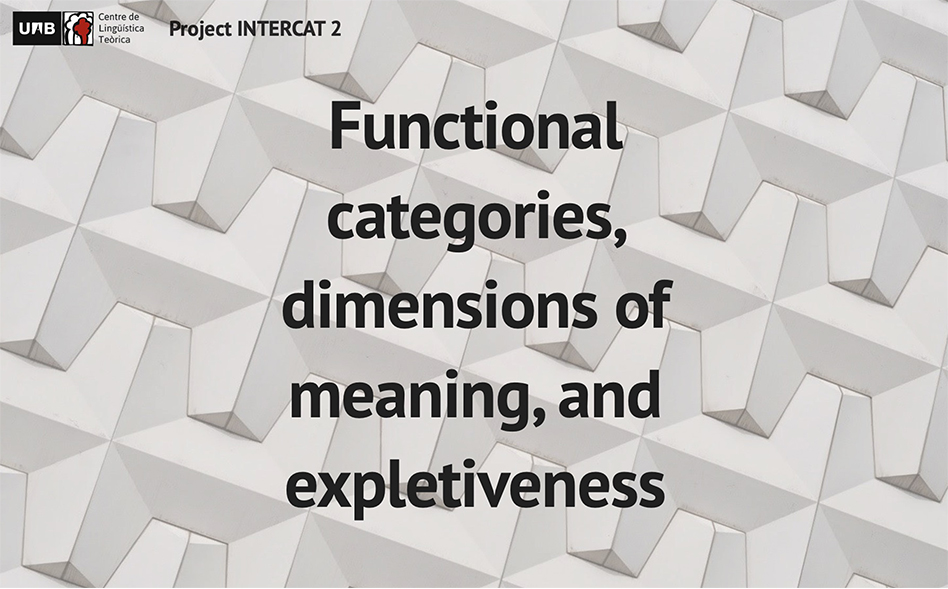El workshop, organitzat per M.Teresa Espinal, Susagna Tubau i Xavier Villalba (projecte de recerca INTERCAT 2), tindrà lloc entre el 12 i el 14 de juny del 2024 a la UAB.
The workshop
This conference will bring together researchers from a variety of fields to explore the relationship between functional categories and meaning, with a focus on three specific topics:
- Functional categories and speech act information
The influential work by Krifka on the topic of questions (Krifka 2001, 2015a, 2015b), as well as his recent work on Commitment-based Semantics ((Krifka 2018, 2019, 2021); see also (Geurts 2018, 2019, 2022)) has paved the way for a better understanding of the role of interrogative sentences at the time of different sorts of updates of the common ground, and involving various sorts of commitments of speakers and a variety of forms to restrict future discourse developments. However, such a seminal work has not yet been extended to provide a detailed analysis of the full gamut of interrogative sentences in Romance and Germanic languages, where interrogatives display a rich set of syntactic forms, interpretative nuances and prosodic contours. Moreover, exclamations and exclamative sentences are still understudied and new proposals are necessary for analyzing their differences with interrogatives at the level of private and public commitment and articulating a detailed map of active functional categories. - Strengthening and dimensions of meaning
The question of what (in)definiteness means and how it is expressed in languages that do not possess overt articles still presents an unresolved problem in formal approaches. In recent research on Russian (Seres 2020; Seres et al. 2021; Seres and Borik 2021) it is argued that the default interpretation of bare nominals in Russian is indefinite, whereas definiteness results from a pragmatic strengthening mechanism. This hypothesis is corroborated by existing (although still scarce) experimental evidence (Serés et al. 2023; Šimík and Demian 2020). Some questions, though, are yet unanswered, such as what kind of mechanisms give rise to this pragmatic strengthening and how precisely they bring out a definite interpretation for a bare nominal, and what is the role of anaphoricity, ontological uniqueness, and topicality. This topic is also worth investigating in relation to the gesture / sign interface (especially on different dimensions of meaning and expressiveness). - Expletiveness and expressive Speech Acts
While syntactic expletives do not affect the truth-conditions of propositions by definition, recent works on semantic expletive elements have systematically remarked the existence of special meaning nuances associated with the use of expletives (Delfitto et al. 2019; Greco et al. 2018; Tsiakmakis and Espinal 2022). This topic raises several theoretical questions: Are expletives always linked to an expressive meaning? Can this expressive meaning be accounted for with a commitment-based semantics approach? Which functional elements are more prone to become expletives?
Call for papers
The workshop is open to original contributions dealing with the above topics from all areas of theoretical linguistics.
We are pleased to announce the following invited speakers for each one of the specific topics mentioned above:
- Functional categories and speech act information
- Manfred Krifka (Humboldt-Universität zu Berlin)
- Anna Kocher (Katholische Universität Eichstätt-Ingolstadt)
- Strengthening and dimensions of meaning
- Alda Mari (Institut Jean Nicod, CNRS)
- Jon Ander Mendia (Universitat Autònoma de Barcelona)
- Expletiveness and expressive Speech Acts
- Markus Steinbach (Georg-August-Universität Göttingen) & Cornelia Ebert (Goethe-Universität Frankfurt)
- Evripidis Tsiakmakis (Universitat Pompeu Fabra)
Submission guidelines
Abstracts for talks or posters should be anonymous and no longer than two A4 pages, including references and examples, with 2.5 cm margins, font size 12, single-spaced. The file should be anonymous both in the body of the text and in the filename. At most two submissions per (co-)author are allowed and only one may be single-authored. Once accepted it will not be possible to introduce changes in authorship after submission. Accepted oral presentations will be 20 minutes long, followed by 10 minutes for discussion. Submissions must be made through the conference Easyabs page: https://easyabs.linguistlist.org/conference/FCDME2024
The deadline for submissions is January 15th, 2024
Contact: Xavier Villalba (Xavier.Villalba@uab.cat)


